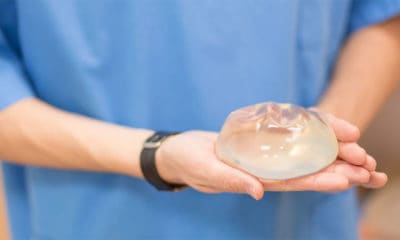
The FDA made a statement concerning a potential small association between breast implants and ALCL today 1-26-11.
PSC Breast Co-chair Dr. Caroline Glicksman Overviews the important patient message of the FDA press release
[media id=643 width=640 height=480]
Key points for patients include:
1. ALCL of the breast is an extremely rare illness and should not be confused with breast cancer. Much more data is needed to make any clear statement, but the FDA does not recommend that patients with breast implants do anything differently, and this report had no bearing on the FDA position that breast implants are safe and effective.
2. To date no epidemiological study has shown a cause and effect relationship between ALCL and breast implants.
3. The risk of ALCL in patients with breast implants is exceedingly low – .05 – 1: 1 million person years. Thus a woman with breast implants is 10 -200 times more likely to be hit by lightning than to contract ALCL.
4. Despite years of research, the worldwide data on this subject is very limited. In fact, in the few cases that have been identified, the actual pathological diagnosis did not always follow all protocols to make the diagnosis of a true Lymphoma. This coupled with the observation that the identified cases all behave inconsistently,some with characteristics of a more benign process. Many of the reported cases resolved with implant removal or no treatment in some cases. More data is needed but the entity may represent a pathological misdiagnosis of a lymphoid hyperplasia. There is also growing data to suggest that this entity is more like the benign cutaneous T cell lymphoma (a form of lymphoid hyperplasia) that has a typically indolent course.
The American Society of Aesthetic Plastic Surgery released this to physicians :
The FDA released a White Paper and Advisory Statement on Anaplastic Large Cell Lymphoma (ALCL) in women with breast implants. It is important that all plastic surgeons understand the current state of knowledge surrounding this condition and are prepared to discuss this with their patients.
This condition is incredibly rare – in the past 25 years only 34 cases have been reported worldwide among an estimated 10 million+ implanted devices. In addition, as opposed to the systemic, nodal pattern of ALCL, in published reports ALCL seen in the presence of breast implants has demonstrated an indolent course: both with women experiencing aggressive systemic therapy as well as those treated with simple explantation and capsulectomy – the condition was resolved. While this condition does fulfill the current WHO classification for ALCL, a form of Non-Hodgkins Lymphoma, this condition potentially represents a distinct clinical entity. This condition is clearly NOT breast cancer.
The FDA has not changed the status or availability of breast implants and has reaffirmed that the devices are safe and effective. However, in order to better understand this rare condition, the FDA has entered into an agreement with ASPS to create a registry for ALCL cases in the presence of breast implants. Until this registry is up and running, any clinical case should be reported to FDA. The FDA documents, which can be found at: https://www.fda.gov/MedicalDevices/Safety/AlertsandNotices/ucm240000.htm provide instructions for how to report any clinical cases to FDA. ASAPS fully supports the FDA and ASPS in this endeavor.
Because of the extreme rarity of this condition, the vast majority of plastic surgeons will never see a single case in a lifetime of practice. However, if you have a patient who presents with symptoms such as a delayed seroma after implant placement or a mass involving a capsule you should be aware of this rare differential diagnosis. The FDA White Paper contains suggestions for evaluation, if ALCL is suspected. Because of the extreme rarity of this condition, at this point no standard treatment has been determined.
The American Society of Plastic Surgeons released this:
Today the Food and Drug Administration (FDA) issued a communication to inform health care practitioners and the public about a possible association between breast implants and anaplastic large cell lymphoma (ALCL). Although ALCL is extremely rare, the FDA believes that women with breast implants may have a very small but increased risk of developing the condition. ASPS has been actively engaged with the FDA on this matter. The American Society of Plastic Surgery is collaborating with the Agency to develop a centralized registry to collect more information on existing case reports and any new cases that may be identified going forward.
The Agency has posted two resources on its website. The first is a Safety Communication that provides a summary of the issue, recommended actions for physicians and patients, and how to report information to the FDA. The second is a more detailed report of the FDA’s preliminary findings and analyses on ALCL in women with breast implants.
Following the signing of a Confidential Disclosure Agreement with the Agency, ASPS was asked by the FDA to comment on both documents. Working with both internal and outside scientific experts, ASPS provided extensive comments, some of which are reflected in the final documents.
The FDA has provided the following links to their documents:
FDA Medical Device Safety Communication: Reports of Anaplastic Large Cell Lymphoma (ALCL) in Women with Breast Implants
Anaplastic Large Cell Lymphoma (ALCL) In Women with Breast Implants: Preliminary FDA Findings & Analyses
The FDA has issued a press release and is conducting a media conference call and stakeholder call today.
Other reports in the media on this subject:
From Healthcare Channel TV:
Some things you need to know about this breast implant “cancer” scare.
- The FDA official behind it is Dr. Maisel who is brand new on the job. His background is as a Beth Israel electrophysiologist who has been very critical of medical device safety. However, after joining the FDA late last year, the new GOP congress has caused the FDA to back away from ICD safety. Now, he is going after breast implants.
- The diagnosis of lymphoma is not a black or white 100% certain diagnosis. It is a judgment call. The FDA report lays out many inconsistencies with this type of ALCL “lymphoma” and the type normally found. It is quite likely that these T-cells were just part of the normal chronic foreign body reaction.
- All of the cases recovered completely when the implants were removed, again supporting that this is not even cancer.
- Even if the cases were real lymphoma, the statistics are nowhere near confidence. They are collecting more data in a registry now.
Given the past scares in breast implants that were eventually debunked, this is very inappropriate for the FDA to do at this point in the data collection.















Facebook
Twitter
Instagram
YouTube
RSS